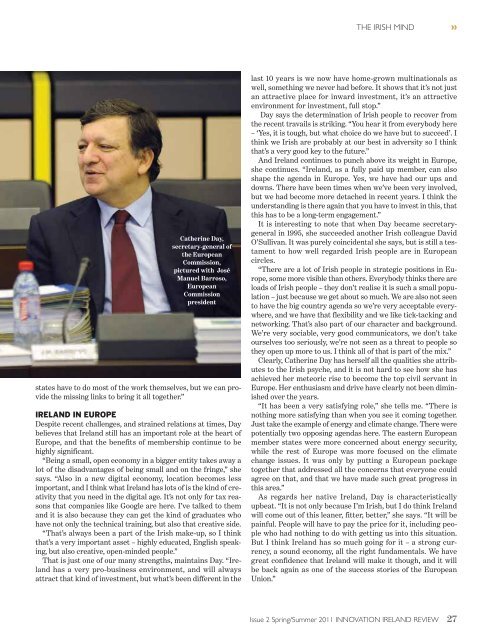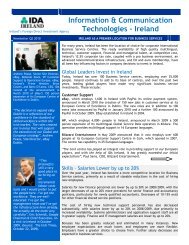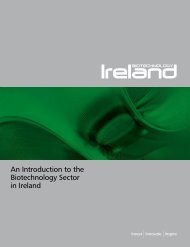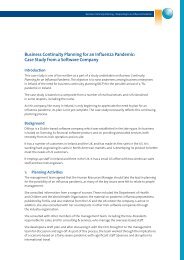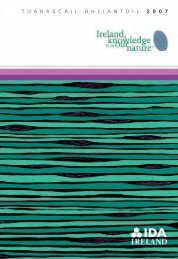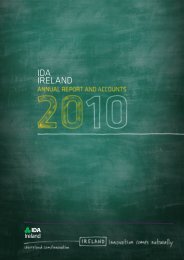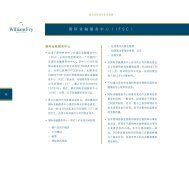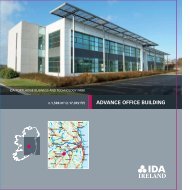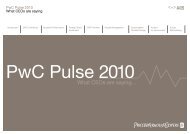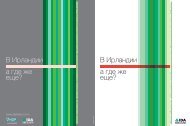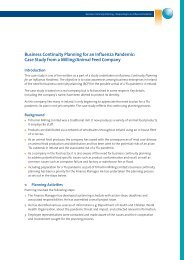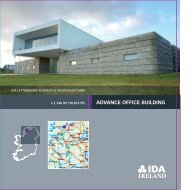Creativity - IDA Ireland
Creativity - IDA Ireland
Creativity - IDA Ireland
Create successful ePaper yourself
Turn your PDF publications into a flip-book with our unique Google optimized e-Paper software.
THE IRISH MIND »<br />
Catherine Day,<br />
secretary-general of<br />
the European<br />
Commission,<br />
pictured with José<br />
Manuel Barroso,<br />
European<br />
Commission<br />
president<br />
states have to do most of the work themselves, but we can provide<br />
the missing links to bring it all together.”<br />
IRELAND IN EUROPE<br />
Despite recent challenges, and strained relations at times, Day<br />
believes that <strong>Ireland</strong> still has an important role at the heart of<br />
Europe, and that the benefits of membership continue to be<br />
highly significant.<br />
“Being a small, open economy in a bigger entity takes away a<br />
lot of the disadvantages of being small and on the fringe,” she<br />
says. “Also in a new digital economy, location becomes less<br />
important, and I think what <strong>Ireland</strong> has lots of is the kind of creativity<br />
that you need in the digital age. It’s not only for tax reasons<br />
that companies like Google are here. I’ve talked to them<br />
and it is also because they can get the kind of graduates who<br />
have not only the technical training, but also that creative side.<br />
“That’s always been a part of the Irish make-up, so I think<br />
that’s a very important asset – highly educated, English speaking,<br />
but also creative, open-minded people.”<br />
That is just one of our many strengths, maintains Day. “<strong>Ireland</strong><br />
has a very pro-business environment, and will always<br />
attract that kind of investment, but what’s been different in the<br />
last 10 years is we now have home-grown multinationals as<br />
well, something we never had before. It shows that it’s not just<br />
an attractive place for inward investment, it’s an attractive<br />
environment for investment, full stop.”<br />
Day says the determination of Irish people to recover from<br />
the recent travails is striking. “You hear it from everybody here<br />
– ‘Yes, it is tough, but what choice do we have but to succeed’. I<br />
think we Irish are probably at our best in adversity so I think<br />
that’s a very good key to the future.”<br />
And <strong>Ireland</strong> continues to punch above its weight in Europe,<br />
she continues. “<strong>Ireland</strong>, as a fully paid up member, can also<br />
shape the agenda in Europe. Yes, we have had our ups and<br />
downs. There have been times when we’ve been very involved,<br />
but we had become more detached in recent years. I think the<br />
understanding is there again that you have to invest in this, that<br />
this has to be a long-term engagement.”<br />
It is interesting to note that when Day became secretarygeneral<br />
in 1995, she succeeded another Irish colleague David<br />
O’Sullivan. It was purely coincidental she says, but is still a testament<br />
to how well regarded Irish people are in European<br />
circles.<br />
“There are a lot of Irish people in strategic positions in Europe,<br />
some more visible than others. Everybody thinks there are<br />
loads of Irish people – they don’t realise it is such a small population<br />
– just because we get about so much. We are also not seen<br />
to have the big country agenda so we’re very acceptable everywhere,<br />
and we have that flexibility and we like tick-tacking and<br />
networking. That’s also part of our character and background.<br />
We’re very sociable, very good communicators, we don’t take<br />
ourselves too seriously, we’re not seen as a threat to people so<br />
they open up more to us. I think all of that is part of the mix.”<br />
Clearly, Catherine Day has herself all the qualities she attributes<br />
to the Irish psyche, and it is not hard to see how she has<br />
achieved her meteoric rise to become the top civil servant in<br />
Europe. Her enthusiasm and drive have clearly not been diminished<br />
over the years.<br />
“It has been a very satisfying role,” she tells me. “There is<br />
nothing more satisfying than when you see it coming together.<br />
Just take the example of energy and climate change. There were<br />
potentially two opposing agendas here. The eastern European<br />
member states were more concerned about energy security,<br />
while the rest of Europe was more focused on the climate<br />
change issues. It was only by putting a European package<br />
together that addressed all the concerns that everyone could<br />
agree on that, and that we have made such great progress in<br />
this area.”<br />
As regards her native <strong>Ireland</strong>, Day is characteristically<br />
upbeat. “It is not only because I’m Irish, but I do think <strong>Ireland</strong><br />
will come out of this leaner, fitter, better,” she says. “It will be<br />
painful. People will have to pay the price for it, including people<br />
who had nothing to do with getting us into this situation.<br />
But I think <strong>Ireland</strong> has so much going for it – a strong currency,<br />
a sound economy, all the right fundamentals. We have<br />
great confidence that <strong>Ireland</strong> will make it though, and it will<br />
be back again as one of the success stories of the European<br />
Union.”<br />
Issue 2 Spring/Summer 2011 INNOVATION IRELAND REVIEW 27


